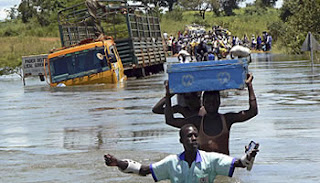http://redskynews.com/?p=4677
Recently, in the country of Chad, flooding
has created a humanitarian disaster. Rising water levels have affected around
700,000 people in October alone, up from the projected 445,000 in September. Twenty
deaths have been reported thus far in 16 of the 22 affected regions in the
country, and 30,000 people have been forced to flee their homes. The disaster
has exacerbated already growing issues of food insecurity, with 45% of the
country experiencing strains, and cases of acute malnutrition in children
jumping from 59,000 in 2010 to almost 100,000 in 2012. Combined with the
discovery of locusts invading agricultural areas has created the need for a $3
million UN emergency fund to aid the people effected by the disaster.
The
plight of the people of Chad has only been hindered by the corruption and
inefficiencies of their government. Out of 177 countries surveyed in the Fund
for Peace’s rankings of the top failed states in the world, Chad ranked 4th.
The country’s government, which has gone through several coups over the past
few decades, has been corrupt, unstable, and has resulted in an unstable
country that is unable to respond to humanitarian needs created by disasters
such as the current flooding. President Idriss Déby, who overthrew the
government in 1990, has set up a system under the guise of a democracy. The
country has a constitution that establishes divisions of power in the
government with a popularly elected executive, popularly elected legislature,
and a judiciary. The true face of the system is more apparent when one notices
that opposition leaders are detained, the freedom of the press is restricted, Déby
has no term limits and almost total control in the country, corruption is
rampant, elections results are regularly disputed, and the country has never
seen a smooth transition of power. The fact that Chad is one of the most failed
states in the world is a direct result of this misuse of power in the
government. Instead of taking step to create measures that would help the
impoverished population of the country, the people in charge have been too busy
manipulating the system so that they can appear progressive to the rest of the
world, and thereby acquire the international funding that goes to progressive
governments.
If
the current administration does not address the current disaster expediently,
unrest in the country could develop quickly. Money needs to be redirected from
government corruption into new housing projects and funding for the growing
medical expenses in the hardest hit regions. Larger scale future reforms also
need to be undertaken such as steps to enact a truly democratic system that is
accountable to the people. The president should have limits to his regional
powers such as term limits, and opposition should not be hindered to compete
for a role in government. Déby should look towards countries like Botswana,
which have built a strong infrastructure off of an educational system and
democratic government that is responsive to the needs of the people. Being a
country rich in oil resources, Chad should not have trouble finding a way to
support its own people in time of crisis. With better governance and
redirection of national funds towards sectors that would help build up the country,
Chad could possibly one day avoid such large scale humanitarian disasters, but
unfortunately at the present they are a long way off from that goal.
Article: http://allafrica.com/stories/201210260754.html?viewall=1
Other Sources: http://www.fundforpeace.org/global/?q=fsi
http://news.bbc.co.uk/2/hi/africa/4118482.stm
http://www.freedomhouse.org/report/freedom-world/2012/chad
Picture: http://redskynews.com/?p=4677

Does the current administration in Chad not see that they could save funds in the long run by addressing humanitarian disasters such as current flooding? Why do neopatrimonial leaders continue to make poor governing decisions in the face of such problems?
ReplyDeleteI think this issue is really contemporary as the US struggles with its own natural disaster in the form of Hurricane Sandy. Natural disasters are very visible ways of seeing a government's relationship with its people. In the case of the US, there is a lot of critique and enthusiasm based on political affiliations and the upcoming election. I believe what you said in that uprisings in Chad based on mismanagement of the state could occur quickly and on a large scale. It's something both the Chad government and the international community really need to start paying attention to.
ReplyDeleteAndrew-
ReplyDeleteGreat analysis of an environmental issue that we have not gotten the chance to cover. But what incentives really exist for Deby to invest in the infrastructure that you are calling for?